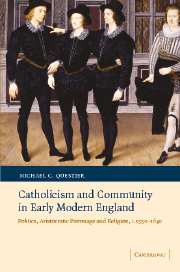 Catholicism and Community in Early Modern England
Catholicism and Community in Early Modern England Book contents
- Frontmatter
- Contents
- List of illustrations
- Preface
- Note on the text
- List of abbreviations
- 1 Introduction
- 2 The local setting
- 3 The emergence of a Catholic dynasty: the Brownes of Cowdray
- 4 The Brownes, Catholicism and politics until the Ridolfi plot
- 5 The Brownes, Catholicism and politics from the 1570s until the early 1590s
- 6 The entourage of the first Viscount Montague
- 7 A period of transition
- 8 The 1590s to the Gunpowder plot
- 9 Catholic politics and clerical culture after the accession of James Stuart
- 10 The household and circle of the second Viscount Montague
- 11 ‘Grand captain’ or ‘little lord’: the second Viscount Montague as Catholic leader
- 12 The later Jacobean and early Caroline period
- 13 The second Viscount Montague, his entourage and the approbation controversy
- 14 Catholicism, clientage networks and the debates of the 1630s
- 15 Epilogue: the civil war and after
- Appendix 1 The Brownes in town and country
- Appendix 2 The families of Browne, Dormer, Gage and Arundell
- Index
- Titles in the series
11 - ‘Grand captain’ or ‘little lord’: the second Viscount Montague as Catholic leader
Published online by Cambridge University Press: 06 July 2010
- Frontmatter
- Contents
- List of illustrations
- Preface
- Note on the text
- List of abbreviations
- 1 Introduction
- 2 The local setting
- 3 The emergence of a Catholic dynasty: the Brownes of Cowdray
- 4 The Brownes, Catholicism and politics until the Ridolfi plot
- 5 The Brownes, Catholicism and politics from the 1570s until the early 1590s
- 6 The entourage of the first Viscount Montague
- 7 A period of transition
- 8 The 1590s to the Gunpowder plot
- 9 Catholic politics and clerical culture after the accession of James Stuart
- 10 The household and circle of the second Viscount Montague
- 11 ‘Grand captain’ or ‘little lord’: the second Viscount Montague as Catholic leader
- 12 The later Jacobean and early Caroline period
- 13 The second Viscount Montague, his entourage and the approbation controversy
- 14 Catholicism, clientage networks and the debates of the 1630s
- 15 Epilogue: the civil war and after
- Appendix 1 The Brownes in town and country
- Appendix 2 The families of Browne, Dormer, Gage and Arundell
- Index
- Titles in the series
Summary
We have already witnessed how, at the time of James Stuart's accession, the second Viscount Montague tried to make a pitch for public attention and for some measure of influence among his fellow Catholics. And in the 1604 parliament he had made a noisy though disastrous bid to set himself up as a leading representative of the Catholic community in its opposition to the new recusancy legislation. His involvement in the Gunpowder debacle, we might imagine, would have persuaded him that it would be better to retire gracefully from view and not to meddle in such matters again.
But this he evidently did not do. The year after his public reverse in the House of Lords we find him lobbying the papacy in support of the secular clergy who were asking that Rome should intervene in order to reform the state of English Catholicism. A letter from Montague to Pope Paul V, dated 15 August 1605, summarised the conditions under which Catholics lived in England, and put the case for the reinstitution of Catholic episcopal government within the realm.
In incredibly florid Latin, Montague set out many of the key issues which figure repeatedly in most of the secular clergy's protestations and petitions to the curia during the Jacobean period. The persecution was getting worse (‘persecutio magis magisque quotidie innovatur’). Rumours were spreading to foreign princes, however, that this had nothing to do with religion.
- Type
- Chapter
- Information
- Catholicism and Community in Early Modern EnglandPolitics, Aristocratic Patronage and Religion, c.1550–1640, pp. 341 - 386Publisher: Cambridge University PressPrint publication year: 2006


